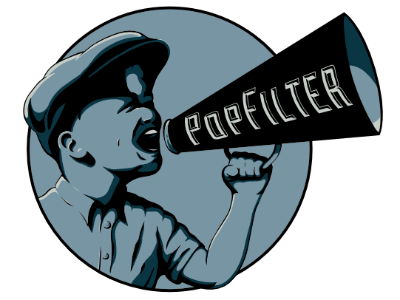POP FILTER VS. THE CLASSICS
POP FILTER
VS.
LA STRADA
Sometimes it’s hard to tell the difference between simple movies, where familiar characters and storylines are used to tell an allegory about things that are much more important than the plot, and hacky shit, where unoriginal characters and storylines are used to tell a story that is spoon fed to audiences by producers who think that everyone is an idiot who will like their shit regardless of quality. There are a couple of easy ways, but one of the easiest, let’s be honest, is to figure out if the movie is considered a classic or not. I don’t think that any movie deserves the benefit of the doubt, nor should you bring your pre-conceived notions in to the theater with you. But if most people who have seen the movie consider it a classic, you instinctually begin with an outlook that has you trying to figure out why the film is good, as opposed to just kicking back and assuming it’s bad.
Federico Fellini’s La Strada definitely fits into the first category, a simple yet effective allegory, but the reasons for that may not be clear at first. It tells the story of a young girl named Gelsomina, who is purchased from her family by Zampano, a carnie of sorts, who can break a chain wrapped around his chest by flexing…and nothing else. Gelsomina is to be Zampano’s assistant/clown, not to mention maid/clown and whore/clown. Just to light one last proverbial candle in the boudoir that is Gelsomina and Zampano’s whirlwind romance, Gelsomina is…different. Not like goth different or artist different. Like Forrest Gump different. Like The Other Sister different. Like Corky from Life Goes On different. She’s a tard.
How mentally deficient Gelsomina is is always a little unclear. According to her mother/pimp, the sandals on her feet have a higher I.Q. than her doltish daughter. But as the movie progresses, that seems less and less true. She’s more like if Charlie Chaplin’s Tramp character stepped off the screen and into real life. You wouldn’t think he was dumb, just a little off. And it’s with those Chaplinesque wide eyes and expressive face that Gelsomina watches the world. Her reactions to everything make more sense today than they did then, as she is surprised when her “boss†beats her, and probably rapes her, as opposed to just accepting that that’s how the boy/girl relationship works. If she’s a little slow, I must be too.
After travelling from town to town performing for whatever loose change they can get, the Dynamic Duo hook up with a circus which, in their line of work, is like being called up to the show. There they meet a trapeze artist named Il Matto, commonly known as the Fool. The Fool, or Clown, in most Shakespeare plays is typically the smartest man in the room, covered up in unfortunate make-up and ridiculous costumes. That’s the role that Il Matto tries to play here, to varied results. He’s a free-spirit who hates Zampano and his manly chauvinistic ways, has a thing for Gelsomina, and uses his wit and speed to torment Zampano, eventually resulting in Zampano pulling a knife on him and getting arrested.
If I gave you three circus jobs (clown, strong man, trapeze artist), and three characters (the simple girl, the overbearing brute, and the free-spirit), do you think it would be hard to match them up? Probably not. This may sound like a cheat, but it allows to us to easily pinpoint an archetype using each of their roles in the circus, and build from there. The interactions between the three of them (the movie doesn’t really pick up until the Fool is introduced, about halfway through) give the movie all of its meat, asking all of the questions that we deem important, and answering just the ones that Fellini deems important. Is the trapeze artist a hero for taking Zampano down a peg, or is he just an asshole picking on those that mentally weaker than him? Is he jealous of his strength? Does Zampano hate the trapeze artist for being smart? Does Gelsomina love Zampano, or just know nothing else? Is it impossible for Zampano to ever love Gelsomina, much less tell her he would be sad if she died? Would he really not be sad, or is that just typical strong man posturing? I’m not going to give you the answers to these questions, but instead just assure you that they are there. You’re not watching trash, even though it seems like nothing more than an odd comedy about an abusive relationship.
-Ryan Haley

